|
|
|
Sort Order |
|
|
|
Items / Page
|
|
|
|
|
|
|
| Srl | Item |
| 1 |
ID:
087275
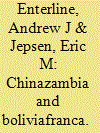

|
|
|
|
|
| Publication |
2009.
|
| Summary/Abstract |
Despite a longstanding focus on the systemic distribution of power in the study of international relations, scholarship during the past 20 years increasingly emphasizes the role of domestic politics in foreign-policy-decision making. This simulation enables participants to experience negotiating an international issue-a territorial dispute between two fictitious states, Chinazambia and Boliviafranca-in the context of this "two-level game" between domestic and international environments. The simulation furnishes a vantage point from which students can assess realist, liberal, and alternative theoretical perspectives on international relations as they affect policy making. The simulation is flexible and can be executed under a variety course contexts, as well as time and participation constraints. Additionally, the simulation provides ample opportunity for a number of enriching postsimulation activities.
|
|
|
|
|
|
|
|
|
|
|
|
|
|
|
|
| 2 |
ID:
087283
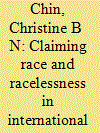

|
|
|
| 3 |
ID:
087269
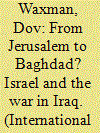

|
|
|
|
|
| Publication |
2009.
|
| Summary/Abstract |
The prevailing opinion that the Bush administration took the United States to war against Iraq in March 2003 under false pretenses has led many to believe that Israel's security was the secret rationale for the war. According to this "war for Israel" thesis, neoconservative policymakers in the Bush administration, the pro-Israel lobby in the United States, and Israel's government all pushed the United States to go to war with Iraq for the sake of Israel's security. This article critically assesses this controversial claim and examines Israel's role in the U.S. decision to invade Iraq. I argued that while neoconservatives were instrumental in promoting the Iraq war, Israel was not their primary concern and that although American Jewish organizations and the Israeli government did largely support the Iraq war, they did not seek it or actively lobby for it.
|
|
|
|
|
|
|
|
|
|
|
|
|
|
|
|
| 4 |
ID:
087281
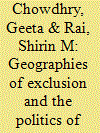

|
|
|
|
|
| Publication |
2009.
|
| Summary/Abstract |
In this essay, we argue that race has yet to be integrated as an analytical category shaping the study and teaching of international relations. We suggest that although the issues of race and gender are systematically coded into central concepts in the discipline, they are made invisible through a "series of ontological and epistemological maneuvers." Focusing on two concepts central to the discipline-sovereignty and the nation-state-we suggest that race can be better integrated into the teaching of international relations by focusing on the ways in which these maneuvers structure the geographies and politics of exclusion and inclusion in international relations. We conclude that raising questions about the ways in which race is taught in the academy is in itself critical-what we teach, how we teach, and who teaches are all questions that need repeated airing for achieving interpretative autonomy as well as a transformative politics.
|
|
|
|
|
|
|
|
|
|
|
|
|
|
|
|
| 5 |
ID:
087278
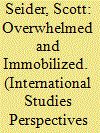

|
|
|
|
|
| Publication |
2009.
|
| Summary/Abstract |
In this study, I compared the shifts in worldview of affluent young adults participating in a course on social justice issues to a control group of similar young adults. In this course, participating students learned about the size, scope, causes, and impact of world hunger and global poverty. However, an analysis of pre- and postsurvey data revealed that the young adults participating in the social justice course experienced a decline over the course of the semester in their support for humanitarian aid in comparison to the control group. Interviews with these young adults, and analyses of their student work, revealed that the manner in which they learned about world hunger and poverty led them to become overwhelmed by the size and scope of these global problems and convinced of their intractability.
|
|
|
|
|
|
|
|
|
|
|
|
|
|
|
|
| 6 |
ID:
087279


|
|
|
| 7 |
ID:
087284


|
|
|
|
|
| Publication |
2009.
|
| Summary/Abstract |
While the salience of race is rising in public discourse, the dominant knowledge structure in international studies has deflected this issue. A look at curriculum and research programs suggests that the transnational dimensions of race are sidelined. The core concept of state sovereignty rarely opens to questions of race. Yet there is a longstanding tradition in transnational race relations, including substantial literature and university initiatives. These have had a tangible impact on the activities of international organizations. To restart such efforts in ways appropriate for our times, it is suggested that six sets of interaction between globalization and race could form the core of a curriculum and research program. This foundation provides the basis for explaining how the politics of "we" and "they," friends and enemies, operates in racializing questions of identity, especially after 9/11, when inclusion and exclusion are increasingly securitized.
|
|
|
|
|
|
|
|
|
|
|
|
|
|
|
|
| 8 |
ID:
087271


|
|
|
|
|
| Publication |
2009.
|
| Summary/Abstract |
This article explores whether and in what sense there is a "United Nations policy," a topic unexplored in the literature. The UN's universal character provides legitimacy, a precious asset in formulating global public policy. It is thus the forum of choice for regime negotiation and norm promotion for contested contemporary challenges, reflecting its comparative advantage and its unique ability to formulate policies that aspire to universal application and relevance. This essay explores the UN's particular contribution to global problem solving for terrorism, sustainability, and controlling pandemics in order to show, through these three illustrations, how the United Nations contributes to the advance or retreat of global governance.
|
|
|
|
|
|
|
|
|
|
|
|
|
|
|
|
| 9 |
ID:
087274


|
|
|
|
|
| Publication |
2009.
|
| Summary/Abstract |
In the recent years, the field of conflict research has produced new findings on the relation between conflict and geography. In doing so, new data sets have been created with the help of GIS software. These data sets include variables relevant for the study of conflict with a spatial component. However, the use of geographic data requires specialized software and substantial training and therefore involves high entry costs for researchers and practitioners. This paper introduces the WarViews project whose aim is to create an easy-to-use front end for the exploration of GIS data on conflict. It takes advantage of the recent proliferation of Internet-based geographic software and makes geographic data on conflict available for these tools. With WarViews, geographic data on conflict can be accessed, browsed, and time-animated in a few mouse clicks, using only standard software. As a result, a wider audience can take advantage of the valuable data contained in these databases, for example, as supplementary data for conflict case studies or for classroom demonstrations. We present two versions of WarViews. The static version runs in a web browser and allows the user to switch between different data sets. The dynamic version is based on Google Earth and can time-animate geographic data such that the development over time can be monitored. The WarViews website can be freely accessed at .
|
|
|
|
|
|
|
|
|
|
|
|
|
|
|
|
|
|
|
|
|